Select Language
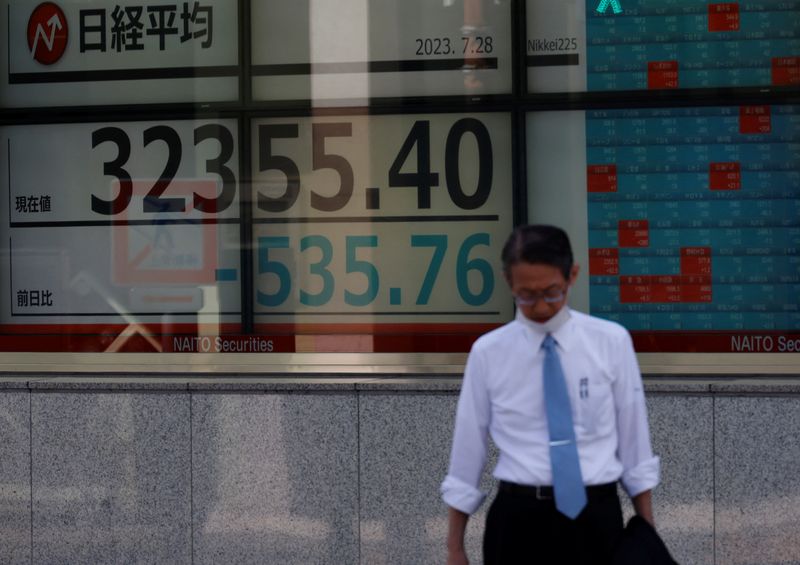
By Rae Wee
SINGAPORE (Reuters) - Asian shares extended a global sell-off on Wednesday, while the dollar and Treasury yields jumped as traders pared back expectations for the pace and scale of rate cuts by the Federal Reserve this year.
The latest shift in rate expectations came after an upside surprise in U.S. inflation on Tuesday which showed the consumer price index (CPI) rising 3.1% on an annual basis, above forecasts for a 2.9% increase.
Futures now point to about 90 basis points of easing priced in for the Fed this year, compared to 110 bps prior to the data release and 160 bps at the end of last year.
That kept pressure on global stocks, which had rallied strongly towards the end of last year on aggressive bets for rate cuts by major central banks globally in 2024.
MSCI's broadest index of Asia-Pacific shares outside Japan fell 0.3% and was headed for a fifth straight day of losses.
S&P 500 futures edged 0.06% higher, while Nasdaq futures gained 0.11%. EUROSTOXX 50 futures lost 0.23%.
"The stronger data pushes back on the hope of a rate cut from the Federal Reserve any time soon," said Daniela Hathorn, senior market analyst at Capital.com.
"We'll likely have to wait for the second half of the year for the Fed to start cutting, but the issue isn't so much whether the bank will cut rates this year, as that is an almost certainty at this point, but how many rate cuts there will be."
Even Japan's standout Nikkei was not spared from the beating and fell 0.7%, after gaining 2.9% in the previous session and topping the 38,000 level.
The recent move higher in the Nikkei was helped in part by a sliding yen, which had weakened past the key 150 per dollar level for the first time this year on Tuesday.
The yen last stood at 150.53 per dollar.
"If they do try intervention, I think it'll be near... the (dollar/yen) high from October 2022 and the high we saw in mid-November," said Tony Sycamore, a market analyst at IG, referring to intervention efforts from Japanese authorities to shore up the currency.
Japan's top currency officials warned on Wednesday against what they described as rapid and speculative yen moves overnight.
Elsewhere, stocks in Hong Kong reversed early losses to trade higher after returning from the Lunar New Year holidays. The Hang Seng Index rose 0.9%.
Mainland China's financial markets remain closed for the week. [.SS]
HIGHER FOR LONGER
The prospect that U.S. rates are likely to stay elevated for longer than initially expected pushed the benchmark 10-year Treasury yield to an over two-month high of 4.3320% on Wednesday. [US/]
The two-year Treasury yield, which typically reflects near-term interest rate expectations, last stood at 4.6286%, having similarly scaled a two-month top of 4.6730% in the previous session.
That's helped the greenback firm near a three-month peak against a basket of currencies at 104.76. The dollar index hit its strongest level since November on Tuesday.
"The attendant, broad-based U.S. dollar surge admittedly reflects (the) corresponding surge in U.S. Treasury yields," said Vishnu Varathan, chief economist for Asia ex-Japan at Mizuho Bank.
Sterling steadied at $1.26085, ahead of UK inflation data due later on Wednesday.
The pound spiked briefly in the previous session on data showing British pay grew at the weakest pace in more than a year at the end of 2023, but the slowdown was probably not significant enough to spur the Bank of England into quicker action towards cutting interest rates.
In cryptocurrencies, bitcoin retreated from the $50,000 level and last bought $49,600. [FTX/]
Oil prices meanwhile edged lower, reversing some of Tuesday's gains as geopolitical tensions lingered in the Middle East and eastern Europe. [O/R]
U.S. crude edged marginally lower to $77.86 a barrel. Brent futures eased eight cents to $82.69.
Gold was little changed at $1,991.89 an ounce. [GOL/]
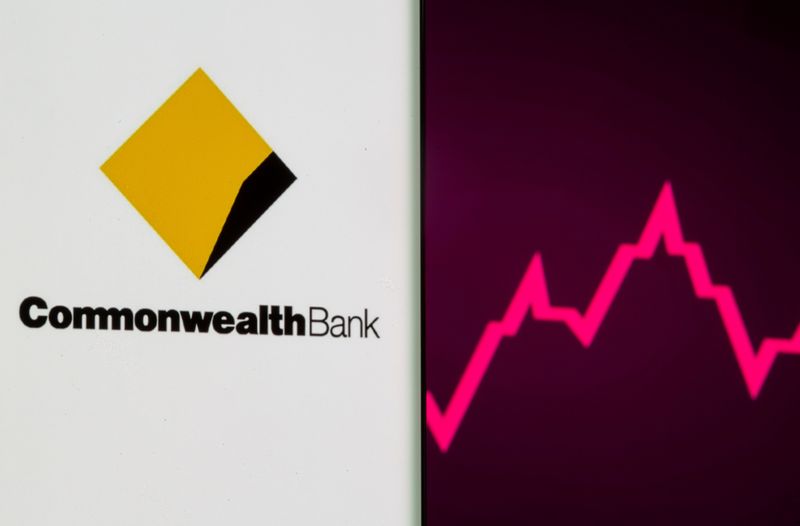
By Sameer Manekar and Praveen Menon
SYDNEY (Reuters) -Commonwealth Bank of Australia on Wednesday warned of downside economic risks building in Australia from continued high interest rates and persistent inflation, as the country's largest lender posed a drop in its first-half profit.
The bank's profit, which still beat expectations, came a day after mortgage lending challenger Macquarie Group (OTC:MQBKY) said it was gaining market share and signals a tough year for Australia's "Big Four" banks as they enter an environment of lower margins and fees.
"As cash rate increases have a lagged impact on households and business customers, we expect financial strain to continue in 2024, with an uptick in our arrears and impairments," CBA CEO Matt Comyn said in a statement.
Shares of CBA fell 2.4%, with the broader Australian index down about 1% as of 0255 GMT.
Comyn said in a briefing after the results that the rising cost of living was being felt an increasing number of households and businesses, and as a consequence customers had reduced their spending.
"Inflation is falling but still remains too high," Comyn told analysts and investors on the call.
"And we expect economic growth to fall below 1.5% this year. Our base case remains a soft landing, and we're expecting these pressures to ease as inflation and interest rates start coming down later this year," he said.
CBA's profit reflects the earnings challenges Australian banks are facing from higher costs and a contraction in net interest margins (NIM), Daniel Yu, Vice President for Moody’s Investors Service said in a note.
"We expect these headwinds to persist in 2024 as tight competition for both lending and, deposits weigh on banks’ NIMs and operating costs increase further as the effects of elevated inflation linger," he said.
CBA's primary competitors are Westpac, National Australia Bank (OTC:NABZY) and ANZ Group.
SHARES RALLY
For the six months ending Dec. 31, CBA's cash profit fell 3.1% to A$5.02 billion ($3.24 billion) from A$5.18 billion a year earlier as intense mortgage competition and higher expenses due to inflation squeezed margins.
Despite that, the cash profit came in above a Visible Alpha consensus of A$4.95 billion.
Before the result, CBA's shares had jumped more than 20% since November, outshining a 12% rise in the wider market on the back of some investors fleeing China's battered markets and others switching to equities on expectations of interest rate cuts.
Comyn, however, said the bank's valuation was driven by consistent profitability and by the fact that it was very large and had by far the strongest deposit base in Australia.
UBS analyst John Storey said in a note that CBA had needed to deliver a strong set of results given the recent share price rally.
"Despite not living up to expectations, CBA delivered $5B in cash NPAT, at a point in time when the bank has endured extreme levels of pricing pressure in mortgages & deposits. If the mortgage market rationalizes, CBA is well placed," Storey added.
CBA's home loan portfolio shrank to A$582 billion at December-end from A$584 billion at the end of June, while Macquarie's grew to A$117.9 billion at end-December from A$114.2 billion at the end of June.
CBA's net interest income from continuing operations on a cash basis slipped 2% to A$11.4 billion as its net interest margin declined 11 basis points to 1.99% versus the prior year period.
The bank's common equity tier 1 capital ratio stood at 12.3% as at December-end, slightly above 12.2% as at June-end. It declared an interim dividend of A$2.15 per share, up from A$2.10 last year.
($1 = 1.5504 Australian dollars)
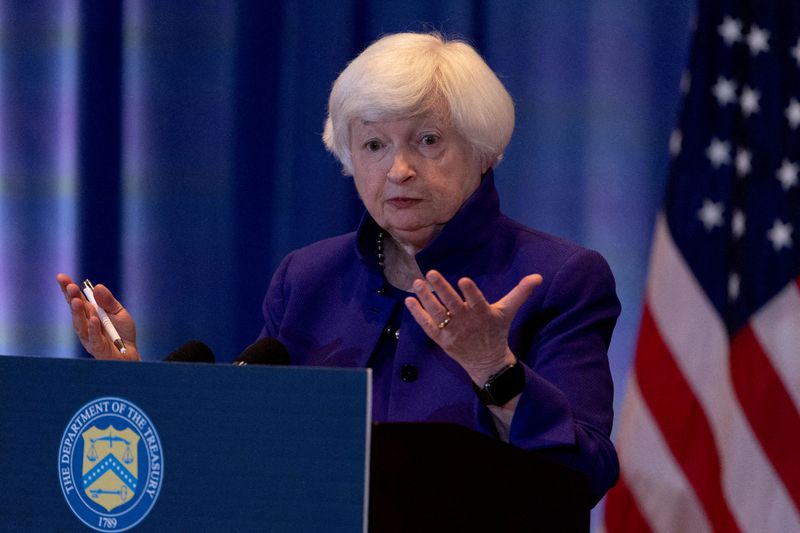
By David Lawder
WASHINGTON (Reuters) - U.S. Treasury Secretary Janet Yellen said on Tuesday that consumer price index data for January showed progress in the fight against inflation despite a surge in the cost of shelter that pushed up the index more than was forecast by economists.
Yellen, speaking during an event at a Pittsburgh hospital, focused on the year-on-year CPI inflation figure of 3.1%, not the surprise 0.3% month-on-month surge in January.
"This morning's CPI report showed that, in January, the headline consumer price index fell to 3.1 percent. That's six percentage points below its peak in June of 2022," she said. "At the same time, the recession that many forecasters predicted we would need, to see inflation come down, hasn't materialized."
The hotter-than-expected consumer inflation reading helped drive down stocks on Wall Street, pushing back market expectations for Federal Reserve interest rate cuts. The data was somewhat at odds with Yellen's recent narrative that a "soft landing" for the U.S. economy was under way, with inflation tamed and wage growth outpacing prices pushed up by high post-pandemic inflation.
LOWERING HEALTH COSTS
Yellen stuck to that line in her remarks at the West Penn Hospital in Pittsburgh, where she discussed efforts taken by President Joe Biden's administration to cut healthcare costs.
"We have made significant progress in our fight to bring down inflation," with the prices of key household expenditures like gasoline, eggs and airline fares coming in lower," Yellen said, adding that the U.S. economy continues to grow with a historically strong labor market.
Yellen has traveled across the U.S. this year to promote Biden's economic policies, from tax credits for household clean energy upgrades in Boston that were funded by the 2022 Inflation Reduction Act (IRA) to job training programs funded by the 2021 American Rescue Plan Act.
In Pittsburgh, Yellen highlighted IRA provisions to allow Medicare, the healthcare program for seniors and the disabled, to negotiate prices for key prescription drugs, which is expected to reduce the deficit by more than $95 billion over a decade.
Tax credits extended by the IRA have lowered health insurance premiums, saving an average of $800 a year for 15 million Americans, Yellen said. The IRA also caps Medicare beneficiaries' insulin costs at $35 a month and an out-of-pocket cap on Medicare prescription drug costs is projected to lead to annual savings of $400 per person, she added.
"Having affordable health care leads to stronger financial security for middle-class families. It saves Americans and our country money," Yellen said.
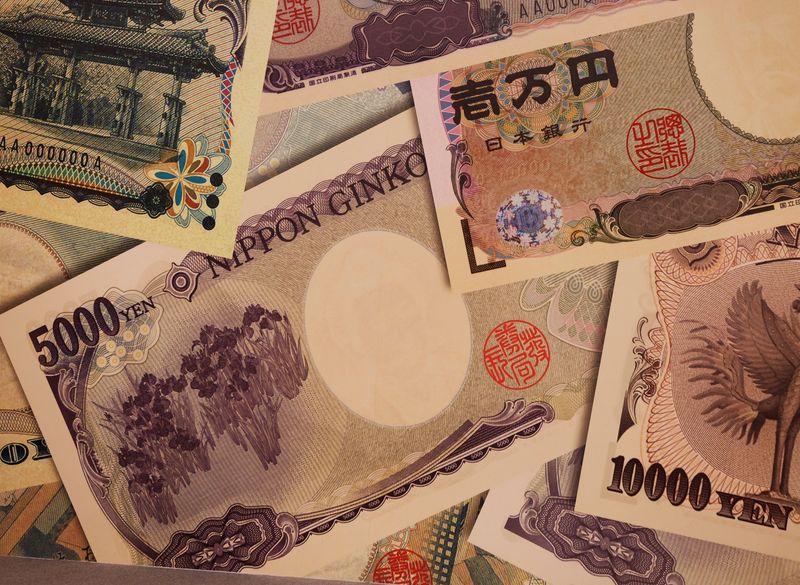
By Tetsushi Kajimoto
TOKYO (Reuters) -Japan's top currency officials warned on Wednesday against what they described as rapid and speculative yen moves overnight when the Japanese currency broke past 150 yen, undermining the trade-reliant economy.
The dollar rose to three-month peaks on late Tuesday after data showed U.S. inflation rose more than expected in January, reinforcing expectations the Federal Reserve will hold interest rates steady in March.
"We are watching the market even more closely," Finance Minister Shunichi Suzuki told reporters. "Rapid moves are undesirable for the economy."
Asked whether authorities could intervene in the currency market, Suzuki left his office at the Ministry Finance without a word.
Earlier, Japan's top currency diplomat Masato Kanda said the nation would take appropriate actions on forex if needed.
"Recent currency moves are rapid. The yen has weakened by nearly 10 yen over the period of one month or so, such a rapid move is not good for the economy," Kanda, the vice finance minister for international affairs, told reporters at his office.
When asked whether the appropriate steps could include intervening in the market to stem the yen weakness, Kanda said authorities would take the most appropriate action.
"We are always watching the market 24 hours a day, 365 days a year to prepare for anything that may happen, just like natural disasters."
Market players have been pondering the future pace of the Fed rate cuts while speculating about the timing about the Bank of Japan's exit from negative interest rates policy.
Japan intervened in the currency market three times in 2022 when the yen plunged to 32-year lows near 152 yen to the dollar, conducting rare dollar-selling, yen-buying intervention.
Authorities have not intervened in the market since then. Kanda shrugged off speculation that Japan has put a line in the sand around 150 yen.
"We are not targeting specific currency levels, but we are comprehensively taking various factors into account, such as that how rapid the moves are and how far away they deviate from fundamentals."

By Christian Kraemer
BERLIN (Reuters) - Germany's federal government will significantly reduce its forecast for growth in the German economy to just 0.2% in a report due to be released next week, according to a source with knowledge of the matter.
Factors contributing toward the depressed figure — down from October's forecast of 1.3% — included low growth in the global economy and a German constitutional court ruling that blew a hole in the country's budget, according to the source.
The gloomy prospects for Germany's economy in 2024 come after the country's GDP shrank by 0.3% in 2023 under the pressure of high inflation, rising interest rates and a weak global economy.
German business association BDI issued a similarly low forecast in mid-January for growth of 0.3%, warning that the economy was at a "standstill".
An economy ministry spokesperson said they could not comment on the numbers, adding the government would provide comment when the official report was published.
Germany's finance minister Christian Lindner said on Sunday that the coalition government planned to present a concept to strengthen Germany's position as an industrial location this spring, after multiple warnings from both him and Economy Minister Robert Habeck that the country was losing its competitiveness on a global scale.
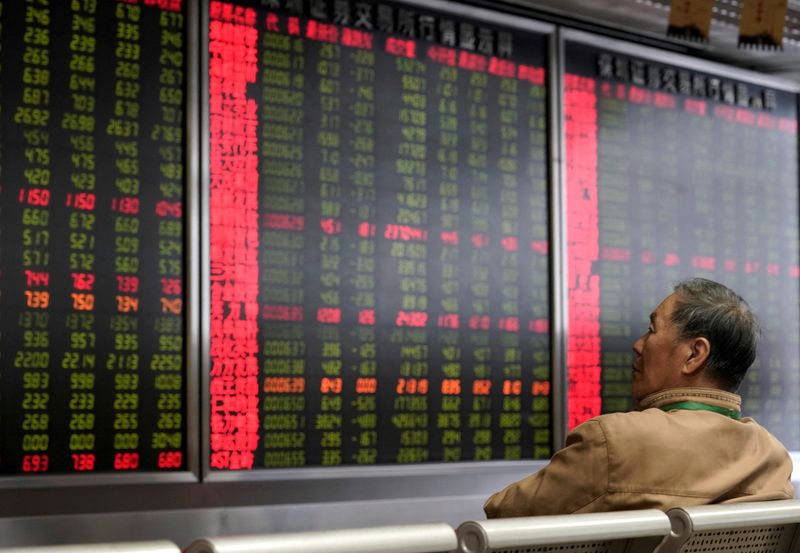
By Ankur Banerjee
SINGAPORE (Reuters) - Asian stocks inched higher and the dollar held steady on Tuesday ahead of a key U.S. inflation report that could help shape the Federal Reserve's rates outlook and determine the timing of interest rate cuts.
Bitcoin remained strong after crossing $50,000 for the first time in over two years, thanks to inflows into exchange traded funds backed by the digital asset. It was last at $50,0097 in Asian hours.
MSCI's broadest index of Asia-Pacific shares outside Japan was 0.15% higher in early trading. The index is down 3% so far in the year.
Japan's Nikkei on the other hand has carried on from last year and is up 12% for the year. On Tuesday, the index rose 1.7% to hit a fresh 34-year high on the back of a weak yen which is nearing the closely-watched 150 per dollar level.
China's financial markets are closed for the Lunar New Year holiday and will resume trade on Monday, Feb. 19, with Hong Kong markets due to resume on Feb. 14, leaving trading in Asia subdued and taking cues from the Wall Street.
On Monday, the Nasdaq slipped in the afternoon session after briefly surpassing its record closing high from November 2021. The benchmark S&P 500 closed lower but remained just above the 5,000-point level it crossed on Friday. E-mini futures for the S&P 500 fell 0.16%. [.N]
Investor attention this week will be on crucial reports on January's U.S. Consumer Price Index (CPI), due later in the day, and Producer Price Index, scheduled to be released on Friday.
A slew of recent data, led by strength in the labour market, has underlined the resilience of the U.S. economy and pushed traders to scale back expectations of early and deep interest rate cuts from the Fed.
Markets have all but chalked off chances of a rate cut in March, with traders pricing in a 13% chance of an easing compared with 77% a month earlier, the CME FedWatch tool showed.
Economists polled by Reuters expect CPI to rise 2.9% on a year-on-year basis, down from 3.4% in the previous month, with annual core CPI inflation also expected to slow to 3.7% in January from 3.9% a month earlier.
However, there is risk of an upside surprise, which could nudge yields higher and further strengthen the dollar, according to Charu Chanana, head of currency strategy at Saxo.
"May rate cut probability is around 70%, and there appears room to push that further to June with markets remaining sensitive to hawkish surprises for now."
Traders are still pricing in 111 basis points of cuts this year versus 75 bps of easing projected by the Fed.
The yield on 10-year Treasury notes was at 4.172%. The dollar index, which measures the U.S. currency against six rivals, was little changed at 104.16.
The Japanese yen, which is sensitive to U.S. rates, was last at 149.38 per dollar, not far from the closely-watched 150 level that analysts said would likely trigger further jawboning from Japanese officials in an attempt to support the currency. [FRX/]
In commodities, U.S. crude rose 0.03% to $76.94 per barrel and Brent was at $81.99, down 0.01% on the day. [O/R]

By Marc Jones
LONDON (Reuters) - Rating agency Fitch fired a warning shot across Britain's bows on Monday, urging the country's government to keep a tight rein on spending at its upcoming budget or risk another downgrade.
Fitch has an AA- grade and a negative outlook - effectively a downgrade warning - on its UK rating and is awaiting the budget next month where the struggling Conservative government is flagging possible tax cuts ahead of an approaching election.
"We estimate that the UK general government deficit rose to 6% of GDP in 2023 from 4.7% of GDP in 2022 and above the 2.7% ‘AA’ category median," Fitch said, adding that government debt of just over 100% of GDP now was "almost double" the median.
Focus for the budget will be on whether the government's new policy measures - which will come against a backdrop of easing of inflation, financing costs and potentially net borrowing - help reduce Britain's debt level.
"Policy choices are key to reducing UK fiscal uncertainty," Fitch said, highlighting that its next planned review of its UK rating was a couple of weeks after the March 6 budget on March 22.
"Implementing the fiscal consolidation projected after the election would entail real cuts in unprotected spending that could be politically challenging," Fitch said.
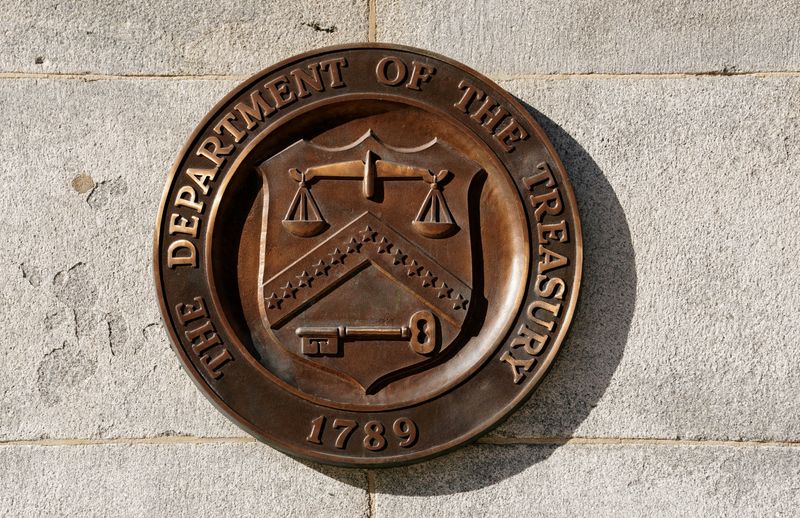
By David Lawder
WASHINGTON (Reuters) - The U.S. federal budget deficit fell sharply in January to $22 billion as receipts hit a record for that month, partly because tax refunds fell after the Internal Revenue Service cleared a backlog of pandemic-delayed tax returns, the U.S. Treasury said on Monday.
The deficit last month was $17 billion, or 43%, less than the $39 billion deficit in January 2023. Outlays for the month grew 3% to $499 billion, while receipts jumped 7% to $477 billion.
For the first four months of the fiscal year, the deficit rose $72 billion, or 16%, to $532 billion as interest costs on the national debt rose. The Treasury said both receipts and outlays were records for the period, with receipts up $112 billion, or 8%, to $1.585 trillion, and outlays up $184 billion, or 10%, to $2.117 trillion.
This January's comparison with a year ago was also helped by the $36 billion bailout of a Teamsters union pension fund in January 2023, as no similar large one-time outlays were recorded this year.
Individual tax refunds, which are deducted from receipts, were $15 billion lower in January than during January 2023. The IRS last year had adopted new scanning technology to enable it to process paper returns more quickly. Individual withheld receipts in January, benefiting from strong employment trends, were up $20 billion, or 7%, from a year earlier.

By Scott Murdoch
SYDNEY (Reuters) - South Korean companies have issued a record volume of dollar bonds so far this year, as they lock in funding to pay for overseas expansion plans and investors search for an alternative given the dearth of Chinese bond issuance.
More than $15 billion worth of bonds have been issued since Jan. 1, according to LSEG data, a 30% increase on the same time last year.
January in Korea is typically a traditionally busy month for bonds, according to bankers, but the rush of deals has surpassed expectations as companies take advantage of a current positive sentiment among investors towards Korea.
Expectations of higher interest rates prompted some Korean corporates to shelve deals in 2023 but upcoming funding needs have prompted the transactions to be revived this year, bankers said.
China's offshore bond deals have fallen sharply as its real estate sector, a key issuer of dollar bonds, remains in crisis and the nation's economy still recovers from the pandemic.
"Korea is a very well-liked credit across different cycles... The country is AA rated, its issuers are either AA, A or BBB category," Daniel Kim, HSBC's co-head of debt capital markets for Asia Pacific, said.
"In the current environment, where there is a lot of uncertainty and macro noise, Korea is seen as a safe haven for a lot of investors to put their money into."
SK Hynix, the world's second largest memory chip maker was one of the biggest Korean companies to tap markets this year as it raised $1.5 billion in a two-tranche deal last month that received orders worth $6.5 billion.
Korean deals accounted for 44% of dollar bonds issued across the Asian region, not including Japan and Australia, where the value of transactions is down 10% year to date, according to the LSEG data.
"I think the pace can be maintained," said Rishi Jalan, Citi's head of Asia Debt Syndicate, referring to the record start to 2024.
"Our overall volume expectations are similar to 2023 for this year, so around $30 to $40 billion. We're not expecting to see any material decline."
The expansion of South Korea's battery makers into markets like the United States is expected to require those companies to continue to need to tap funding markets for the rest of the year.
"Continued growth in the Korea battery sector will require significant investment and financing," Youn Sung Whang, Bank of America's head of Korea capital markets, said.
"This is likely to come via the US dollar bond market as these issuers also look to diversify their investor bases."
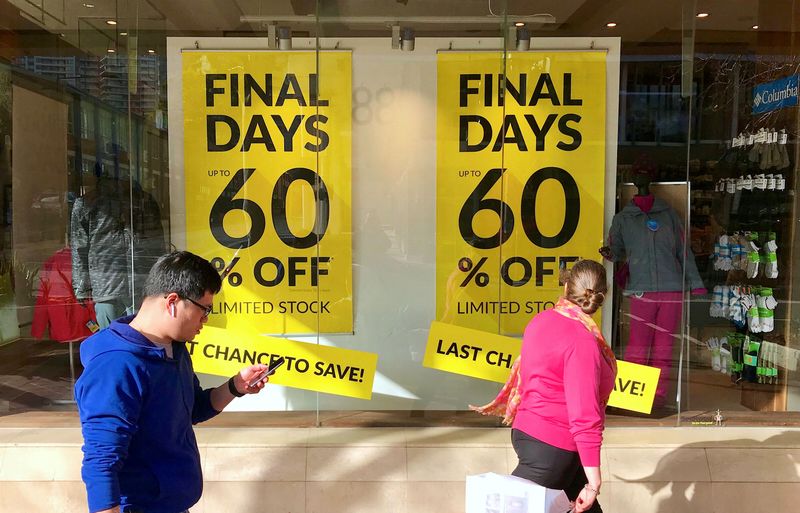
SYDNEY (Reuters) - Australian consumer sentiment rebounded to a 20-month high in February as a slowdown in inflation fuelled hopes interest rates had finally peaked and boosted spending intentions, a survey showed on Tuesday.
The Westpac-Melbourne Institute index of consumer sentiment jumped 6.2% in February, from January when it fell 1.3%. The index reading of 86.0 showed pessimists still outnumbered optimists, much as it has for the past year or more.
Political partisanship was a notable feature of the survey as the confidence index among supporters of the Liberal National opposition slipped to 77.6, while that for supporters of the ruling Labor Party surged to 103.8.
"While sentiment is still firmly pessimistic there finally looks to be some light at the end of the tunnel for Australian consumers," said Matthew Hassan, a senior economist at Westpac.
"Moderating inflation and shifting expectations for interest rates appear to be the main factors behind the lift."
Consumer price inflation slowed sharply to a two-year low of 4.1% in the December quarter, while the Reserve Bank of Australia (RBA) held rates at 4.35% at a policy meeting last week.
The central bank did leave the door open to another hike if needed, but markets are wagering the next move will be down, albeit not until later in the year.
The survey found the proportion of consumers expecting mortgage rates to rise in the next 12 months dropped to 42%, from 52% in January and 61% in December.
This had a big impact on the index measuring whether it was a good time to buy major household items which climbed 11.3% in February.
The survey's measure of family finances compared to a year earlier rose 4.9%, while the outlook for finances over the next 12 months gained 2.4%.
The outlook for the economy for the year ahead jumped 8.8% and the outlook for the next five years firmed 4.4%.
Consumers remained bullish on house prices with that index rising 2.1% to a new cycle high of 161.4.

